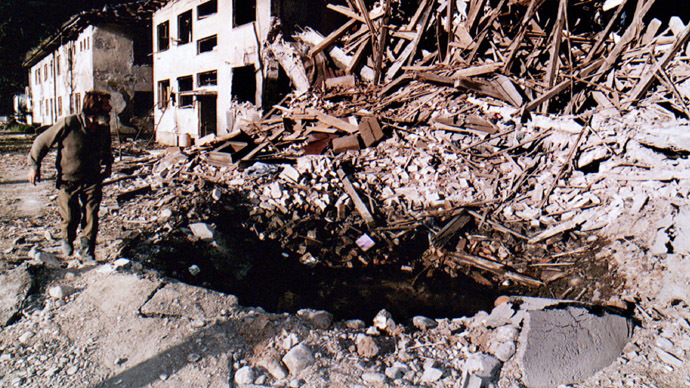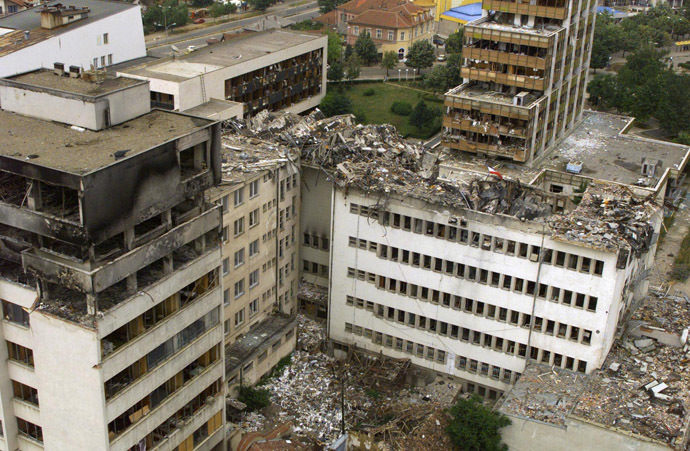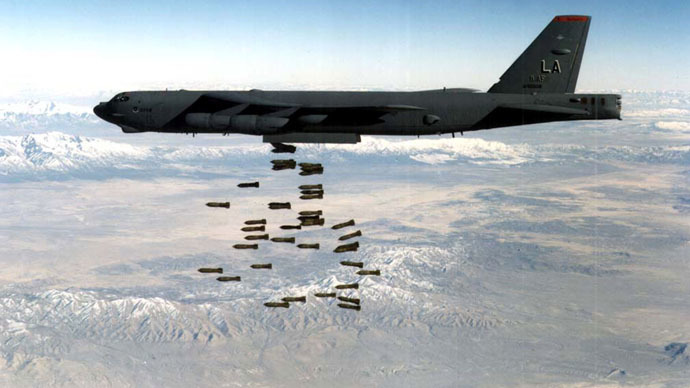NATO bombing of Yugoslavia: Symbolic stage of current World War

If we jump for a minute out of the ever-flowing river of the news, we might realize our being deep inside the Fourth World War.
It started in 1989 with the fall of Berlin Wall that marked the end of the Third one, aka the Cold War. The last chapter of WW4 is obviously the failed attempt to expel Russia from Crimea, but up to now its more symbolic stage remains the NATO bombing of Yugoslavia that started on March 24, 1999, exactly 15 years ago. It was a war against Slobodan Milosevic, but also a war to shift eastward NATO influence and boundaries.
Operation Allied Force, as NATO called it, consisted of 78 days of bombing Milosevic’s Yugoslavia with a progressive intensity, passing from military to civilian infrastructures targets. About 200 Serb civilians died as collateral damage (against about 300 who died in Kosovo, mainly ethnic-Albanian), while NATO had virtually no casualties during operations, only a few soldiers dying in alleged incidents.
‘Perfect’ war
It was the Perfect War. British Military historian John Keegan repented almost theatrically on the Daily Telegraph for his initial old faith in foot soldiers: “There are certain dates in the history of warfare that mark real turning points (…) Now there is a new turning point to fix on the calendar: June 3, 1999, when the capitulation of President Milosevic proved that a war can be won by airpower alone.”
A very clean war with a lot of smart bombs capable to split hair over Serbia and strike only the bad boys, as suggested by the drumming propaganda. To present to Western public opinion such a war of aggression inside Eastern Europe as a Just War was not an easy task in the beginning. But the Hidden Persuaders had on their side the experience of George H. W. Bush’s Gulf War. If the Gulf War was the first televised war, seen through the kind choice of CNN cameras, Yugoslavia was the first internet war.
They had to find a symbolic triggering. This was the Racak massacre, a Kosovo village in which 45 ethnic Albanians were killed by Serbian Army in response to the shooting of four Serb policemen. The NATO narrative was that the bombing was a consequence of Serbian ethnic cleansing, but the truth was, on the contrary, that was NATO intervention to trigger some operations against Kosovo population, in the contest of the war against the separatists of KLA, supported by the US and Germany.

Labour MP Tony Benn (who died a few days ago) said in the British Parliament: “Whatever the legality or morality of the war that has been launched against Yugoslavia, the bombing has gravely worsened the refugee crisis.”
Richard Gott of The (above all suspicion) Guardian believed that “the sudden Kosovo population displacements were triggered by NATO bombing and by the decision of Western governments to impose impossible conditions on the Serbian sovereign state.” As noted in those days always by the Guardian: “The KLA has been resupplied with weapons smuggled across the border from Albania and has reoccupied villages vacated by Serb security forces.”
About Racak also The (above all suspicion) Times had some doubts: “The reality of what happened at Racak is still shrouded by claim and counter-claim. What is known is that four Serb policemen were killed outside the village in a Kosovo Liberation Army (KLA) ambush. Subsequently at least 40 ethnic Albanian men from the village were shot in a dawn attack by the Serbs. The Serbs say that all the dead were KLA guerrillas killed in action. The Albanians say they were all civilians killed after capture.”
But a trigger is not enough, to convince people you need an ideology, because in spite of the death of ideology proclaimed by triumphant neoliberalism, ideology is more alive than ever. Human Rights was this ideology. Let’s be clear: who is against human rights? But one thing are the human rights for which Guatemala Bishop Juan Gerardi was killed by death squads in 1998 for example, another thing is the ideology of Human Rights defended by George W. Bush and Tony Blair.
‘Humanity’ pretext
In the UK, to pave the way for this operation, was the 1997 New Labour Manifesto. It was the creation of ‘ethical foreign policy’: “Labour wants Britain to be respected in the world for the integrity with which it conducts its foreign relations. We will make the protection and the promotion of human rights a central part of our foreign policy. We will work for the creation of a permanent international criminal court to investigate genocide, war crimes and crimes against humanity.”
"Whoever says 'humanity' wants to cheat," wrote Pierre-Joseph Proudhon, then quoted by Carl Schmitt. ‘Whoever Says Humanity’ is also the title of the book that Danilo Zolo, professor of philosophy of law and of philosophy of international law at the University of Florence, wrote on those days. “In the early 1990s,” says Zolo, "humanitarian intervention" was a key element in the international strategy of the US. It claimed that "global security" required that the great powers responsible for world order felt the Westphalian principle of non-interference in the domestic jurisdiction of national states to be out of date. The war sparked off by the United States against the Federal Republic of Yugoslavia - the war in Kosovo in 1999 - finally established the practice of humanitarian interventionism. The humanitarian motivation was thus taken explicitly as just cause for a war of aggression. And the United States has stated that the use of force for humanitarian reasons was legitimate, even though in contrast with the United Nations Charter, the principles of the statute and the judgment of the Nuremberg Tribunal, as well as with international law in general.”

The Italian philosopher Costanzo Preve titled his book on NATO bombing ‘The Ethical Bombing’. Preve said: “The US has created a tragic situation in which the philosophy of universal human rights conflicts directly with its distorted caricature, the ideology of exporting human rights by armed might. In its original Greek meaning, tragedy refers to a hopeless situation where any decision is a bad one. The question of human rights today is perhaps the most tragic of our times. On the one hand, people throughout the world definitely need to be educated to respect human rights. Moreover, this education ought to be philosophically anchored in a real universal dialogue without the obscene prejudice of Western superiority, particularly its most despicable version which comes to us as a divine mandate issued from Ronald Reagan’s City on a Hill. On the other hand, the total subservience of the United Nations to the US and its ignominious puppet regimes has led to a condition of rampant international illegality.”
Ironically, in Italy the Bomb-Bomb-Bomb Milosevic coincided with the first prime minister to come from the old Communist Party, Massimo D’Alema. Wrote the former President of the Republic Francesco Cossiga: "The landing of the ‘Communist’ D'Alema at Palazzo Chigi (the seat of government) took place with the full Washington support, in return to the guarantee that Italy would not pull back in the Kosovo War."
Even more ironically, the bombing started the same year in which the euro was born. With the attack on Yugoslavia the Clinton Administration took the occasion to demonstrate worldwide the political inconsistency of the New Europe, always dependent on the US. Fighting for the ideology of Human Rights in Kosovo, Europe was indeed fighting for the Imperial agenda.
To quote the Italian philosopher Diego Fusaro: “With the collapse of the bipolar structure of the universe, it has started a new phase of conflicts, all different, and at the same time all inside the new Fourth World War. This one is a geopolitical and cultural war declared by the Universal Monarchy to the rest of the world. A war against all the peoples and nations that are not ready to submit themselves to its power, i.e. to its politics of world’s dominion trough the commodity-form.”
The statements, views and opinions expressed in this column are solely those of the author and do not necessarily represent those of RT.
The statements, views and opinions expressed in this column are solely those of the author and do not necessarily represent those of RT.













